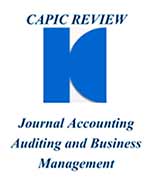Social responsibility information´s disclosure in the argentine financial sector. Explanatory factors.
Published 2019-08-30
Keywords
- corporate social responsibility,
- information disclosure,
- financial sector
How to Cite
Abstract
In this paper, the amount of information disclosed on the social, economic and environmental management of argentine financial institutions and the explanatory factors of the disclosure is analysed.
Based on the fundamentals of the theory of political costs, the determinants of the voluntary disclosure of corporate information are studied through a linear regression model.
The results obtained agree with previous studies (Gamerschlag et al., 2011), associating positively the amount of CSR information disclosed with greater visibility of the company, a structure of ownership of the most dispersed shareholders and the audit of reports of CSR, its relationship with profitability being inverse.
The conclusions obtained are strengthened from the disaggregation of the general index in the environmental, social and economic aspects in a particular way.
Downloads
References
- Archambault, J.J.; Archambault, M.E. (2003) A multinational test of determinants of corporate disclosure. The International Journal of Accounting, 2003, vol. 38, issue 2, 173-194.
- Bayoud, N.S.; Kavanagh, M.; Slaughter, G.(2012). CSR disclosure and corporate reputation in developing countries: case of Libya. Journal of Business and Policy Research, 7 (1). pp. 131-160.
- Belkaoui, A.; Karpik, P. (1989) Determinants of the Corporate Decision to Disclose Social Information. Accounting, Auditing & Accountability Journal, Vol. 2 Issue 1.
- Blacconiere, W.G.; Northcut, W.D. (1997) Environmental Information and Market Reactions to Environmental Legislation. Journal of Accounting, Auditing and Finance, Vol 12, No. 2.
- Brammer, S.; Pavelin, S. (2006) Voluntary environmental disclosures by large UK companies. J Bus Finan Account 33(7 and 8):1168–1188.
- Branco, M. C.; Rodrigues, L. L. (2008). Factors influencing social responsibility disclosure by Portuguese companies. Journal of Business Ethics, 83, 685-701.
- Brown, N.; Deegan, C. (1998) The public disclosure of environmental performance information—a dual test of media agenda setting theory and legitimacy theory, Accounting and Business Research, 29:1,21-41.
- Cooke, T.E. (1992) The Impact of Size, Stock Market Listing and Industry Type on Disclosure in the Annual Reports of Japanese Listed Corporations, Accounting and Business Research, 22:87, 229-237.
- Chen, S.; Bouvain, P. (2009) Is corporate responsibility converging? A comparison of corporate responsibility reporting in the USA, UK, Australia, and Germany. J Bus Ethics 87:299–317.
- Cho, C.; Michelon, G.; Patten, D.; Roberts, R. (2015) CSR disclosure: the more things change…? Accounting, Auditing & Accountability Journal, Vol. 28 Issue: 1, pp.14-35.
- Deegan, C. (2002), “Introduction: The Legitimising Effect of Social and Environmental Disclosures – a Theoretical Foundation”, Accounting, Auditing and Accountability Journal, Vol. 15 No. 3, pp. 282-311.
- Fields, T.D.; Lys, T.Z.; Vincent, L. (2001) Empirical research on accounting choice. Journal of Accounting and Economic 31:255–307.
- García Meca, E., Martínez Conesa, I. (2004) Divulgación voluntaria de información empresaria. Índices de Revelación. Partida doble, pp. 66-77
- Garriga, E.; Melé, D. (2004) Corporate Social Responsibility Theories: Mapping the Territory. Journal of Business Ethics 53: 51.
- Gamerschlag, R., Möller, K., & Verbeeten, F. (2011). Determinants of voluntary CSR disclosure: empirical evidence from Germany. Review of Managerial Science, 5(2-3), 233-262.
- Gray, R., Reza, K., Lavers, S. (1995). Corporate Social and Environmental Reporting – A Review of the Literature and a Longitudinal Study of UK Disclosure. Accounting, Auditing & Accountability Journal. 8. 47-77.
- Gray, R.; Javad, M.; Power, D., Sinclair, D. (2001). Social and Environmental Disclosure and Corporate Characteristics: A Research Note and Extension. Journal of Business Finance & Accounting. 28. 327-356.
- Giner, B. (1997) The influence of company characteristics and accounting regulation on information disclosed by Spanish firms. European Accounting Review, vol. 6, issue 1,45-68
- Hair, J.F.; Black, W.C.; Babin, B.J.; Anderson, R.E. (2010) Multivariate data analysis. A global perspective. Pearson, Upper Saddle River.
- Larrinaga, C.; Carrasco, F.; Correa, C.; Llena, F.; Moneva, J. (2002) Accountability and accounting regulation: the case of the Spanish environmental disclosure standard, European Accounting Review, 11:4, 723-740.
- Matten, D.; Moon, J. (2008). "Implicit" and "explicit" CSR: A conceptual framework for a comparative understanding of CSR. The Academy of Management Review, 33
- Peng, G.Z.; Beamish, P.W. (2008) The effect of national corporate responsibility environment on Japanese foreign direct investment. Journal of Business Ethics 80:677–695.
- Reverte, C. (2008) Determinants of CSR disclosures ratings by Spanish listed firms, Journal of Business Ethics, 88, 351-366.
- Reverte, C. (2009). Determinants of corporate social responsibility disclosure ratings by Spanish listed firms. Journal of Business Ethics, 88(2), 351-366
- Watts, R.L.; Zimmermann, J.L. (1978) Towards a positive theory of the determination of accounting standards. Accounting Review 53(1):112–134.


































